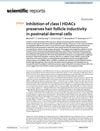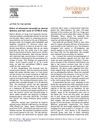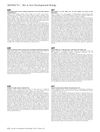 15 citations,
July 2020 in “Dermatologic Therapy”
15 citations,
July 2020 in “Dermatologic Therapy” FPHL is common in women, influenced by genetics and hormones, and can be treated with medications, laser therapy, or hair transplantation.
 39 citations,
January 2012 in “International Journal of Trichology”
39 citations,
January 2012 in “International Journal of Trichology” Melatonin solution helps treat hair loss in men and women.
 4 citations,
December 2021 in “Journal of Pharmacopuncture”
4 citations,
December 2021 in “Journal of Pharmacopuncture” Microneedle Treatment System is effective for hair growth and skin improvement with no serious side effects, but more research is needed.
 41 citations,
July 2015 in “Current Drug Discovery Technologies”
41 citations,
July 2015 in “Current Drug Discovery Technologies” Some plants may help with hair growth and have fewer side effects than synthetic drugs, but more research is needed to confirm their effectiveness.
 23 citations,
August 2019 in “Proceedings of the National Academy of Sciences of the United States of America”
23 citations,
August 2019 in “Proceedings of the National Academy of Sciences of the United States of America” Pollution exposure speeds up hair damage.
 1 citations,
September 2023 in “Stem cell research & therapy”
1 citations,
September 2023 in “Stem cell research & therapy” Mesenchymal stem cells could help treat aging-related diseases better than current methods.
23 citations,
January 2016 in “International Journal of Trichology” Women with female pattern hair loss have lower Vitamin D3 levels.
 January 2025 in “Cosmetics”
January 2025 in “Cosmetics” Astragalus sinicus extracts may help promote hair growth and treat hair loss.
 40 citations,
April 2014 in “Genes & Development”
40 citations,
April 2014 in “Genes & Development” Hormones during pregnancy and lactation keep skin stem cells inactive, preventing hair growth.
 November 2024 in “Applied Sciences”
November 2024 in “Applied Sciences” Placenta products might help with hair loss, but more research is needed.
 39 citations,
September 2013 in “Journal of Cosmetic Dermatology”
39 citations,
September 2013 in “Journal of Cosmetic Dermatology” Herbs can potentially treat hair loss by inhibiting a key enzyme and promoting hair growth, and deficiencies in zinc, biotin, and iron are linked to hair loss.
 1 citations,
December 2017
1 citations,
December 2017 The study suggests that treating early hair loss with Nourkrin® with Marilex® can help prevent further hair loss and may be linked to reducing the risk of lifestyle diseases.

Stem cell therapy shows promise for treating hair loss in androgenetic alopecia.
 February 2024 in “Frontiers in physiology”
February 2024 in “Frontiers in physiology” Hair follicle stem cells help skin heal and grow during stretching.
 January 2018 in “Elsevier eBooks”
January 2018 in “Elsevier eBooks” The document concludes that alopecia has significant social and psychological effects, leading to a market for hair loss treatments.
 6 citations,
December 2021 in “Scientific Reports”
6 citations,
December 2021 in “Scientific Reports” Inhibiting class I HDACs helps maintain hair growth ability in skin cells.
 2 citations,
January 2023 in “Pharmaceuticals”
2 citations,
January 2023 in “Pharmaceuticals” Natural products and phytochemicals may help with hair regrowth, but more research is needed.
 6 citations,
October 2005 in “Indian Journal of Dermatology”
6 citations,
October 2005 in “Indian Journal of Dermatology” The document discusses male and female pattern hair loss, its diagnosis methods, FDA-approved treatments like finasteride and minoxidil, their side effects, and the role of lifestyle changes.
 June 2024 in “Synthetic and systems biotechnology”
June 2024 in “Synthetic and systems biotechnology” A fragment of human type XVII collagen shows great potential for skin health and wound healing.
 75 citations,
October 2016 in “Genes & Development”
75 citations,
October 2016 in “Genes & Development” Cells in hair follicles help create fat cells in the skin by releasing a protein called Sonic Hedgehog.
 December 2024 in “Animals”
December 2024 in “Animals” RORA may help regulate hair growth by affecting hair follicle stem cells.
 9 citations,
January 2016 in “Skin Pharmacology and Physiology”
9 citations,
January 2016 in “Skin Pharmacology and Physiology” The study concluded that both estrogen and androgen receptors, which decrease with age, are linked to skin aging and may be hormonally regulated.
August 2024 in “Cosmetics” Personalized treatments for hair loss are becoming more effective by using genetic information.
 September 2023 in “Journal of movement disorders”
September 2023 in “Journal of movement disorders” Dopaminergic therapy in Parkinson's disease patients is linked to increased hair loss.
 September 2020 in “bioRxiv (Cold Spring Harbor Laboratory)”
September 2020 in “bioRxiv (Cold Spring Harbor Laboratory)” Different fish use the same genes to regrow teeth.
 23 citations,
October 2006 in “Journal of Dermatological Science”
23 citations,
October 2006 in “Journal of Dermatological Science” Ethosomal minoxidil improves hair growth by penetrating deeper into skin and shortening hair cycle.
 27 citations,
November 2013 in “Journal of Dermatological Science”
27 citations,
November 2013 in “Journal of Dermatological Science” The conclusion is that androgenetic alopecia and senescent alopecia have unique gene changes, suggesting different causes and potential treatments for these hair loss types.
 April 2016 in “The journal of investigative dermatology/Journal of investigative dermatology”
April 2016 in “The journal of investigative dermatology/Journal of investigative dermatology” The back of the scalp has more nerve fibers than the front, which may explain why some people feel more sensitivity there.
 August 2019 in “Journal of the American Academy of Dermatology”
August 2019 in “Journal of the American Academy of Dermatology” Ginseng and Albizia extracts help prevent hair thinning with age.
32 citations,
September 2013 in “Breast cancer research” A specific gene variant is linked to a higher risk of hair loss from chemotherapy in breast cancer patients.



























